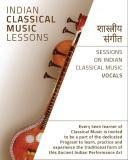 />
/> Jogiwala, Dehradun, India - 248005.
19
Details verified of Sudeep Badoni✕
 Identity
Identity
 Education
Education
Know how UrbanPro verifies Tutor details
Identity is verified based on matching the details uploaded by the Tutor with government databases.






English
Hindi
![]() UKTU 2013
UKTU 2013
Bachelor of Technology (B.Tech.)
Jogiwala, Dehradun, India - 248005
![]() Phone Verified
Phone Verified
![]() Email Verified
Email Verified
![]() Facebook Verified
Facebook Verified
S
Shri Guru Ram Rai Public School, Talab Branch
Saharanpur Road, Dehradun
Report this Profile
Is this listing inaccurate or duplicate? Any other problem?
Please tell us about the problem and we will fix it.
Class Location
![]() Online (video chat via skype, google hangout etc)
Online (video chat via skype, google hangout etc)
![]() Student's Home
Student's Home
![]() Tutor's Home
Tutor's Home
Years of Experience in Vocal Music classes
8
Gender of teacher
Male tutor
Vocal Style taught
Hindustani Singing, Bhajan Singing
Age group catered to
22- 50 years old, 14- 21 years old, Above 50 years
Class strength catered to
Group Classes, One on one/ Private Tutions
Proficiency level catered to
Beginner, Intermediate, Advanced
Class Location
![]() Online (video chat via skype, google hangout etc)
Online (video chat via skype, google hangout etc)
![]() Student's Home
Student's Home
![]() Tutor's Home
Tutor's Home
Years of Experience in Harmonium Classes
8
Age groups catered to
Above 25 yrs, 16 yrs to 25 yrs
Class strength catered to
Group Classes, One on one/ Private Tutions
5 out of 5 13 reviews
Jayant Rawat
"I went as a student and learning Indian classical music. I liked the way of teaching and learnt many many thing from him. Must visit and take the deep knowledge of music. "
Mohit Benjwal
Vocal Music
"I came as a beginner to learn indian classical music. I had weekly classes with him. His love of classical music makes it a real fun and inspiring experience to sing different kind of Raaga. He's also patient and very easy to learn from and be with. I got a good grasp of how to sing in this time and will continue to develop each time I return here. I recommend to everybody intetested in learning Indian classical music in Dehradun uttarakhand. Thank you so much bhaiya for your motivation and guidance."
Megha Dhyani
Vocal Music
"It's a great experience to learn music from an amazing teacher. He always encourages and inspires us as students. "
Parul ravi
"I am learning vocal music from sir. He is wonderful teacher. He teaches music in easy way. He is very practical in music. He is very inspiring human being. After joining the classes I see the lots of improvement in my singing. I am very thankful to sir. "
1. Which classes do you teach?
I teach Harmonium and Vocal Music Classes.
2. Do you provide a demo class?
Yes, I provide a free demo class.
3. How many years of experience do you have?
I have been teaching for 8 years.
Naad is the base of all vibrations and much more than just frequency. Aahat naad is whatever we hear, speak or sing; frequency of sound that we can hear. And then there is Anhad naad (Anaahat naad),...
Voice Culture - Working on Vocal range Mandra Sadhna: One thing you can try is Madra Sadhna i.e, the more you sing and sustain each swara of lower octave, it increases your range itself allowing you...
Multani is a raag of serious nature. Originating from Thaat (Mel or family) 'Todi', but not inheriting any of its properties or raga-ang, Multani stands out with its own uniqueness. Multani is sung or...
Answered on 25/02/2024 Learn Music/Vocal Music
There are many types of vocal music in India:
Broadly categorised into Indian Classical and Carnatic Classical
Indian Classical can be further classified into Dhruvpad Gayan Shaili and Khayal Gayan Shaili.
Apart from this there is Semi Classical Music - Thumri, Chaiti, Kajti, Tappa, Hori, Ghazals are a few to name.
Then there are styles that got inspired from Classical music, like Rabindra Sangeet, Natya Sangeet, Nazrul Geeti, Udn Padhhati and many other forms.
Finally including Folk, Filmy music and Bhajans in this list, there is diversity of beautiful music originating from different parts of India.
Answered on 25/02/2024 Learn Music/Vocal Music
Answered on 29/10/2023 Learn Music/Instrumental Music/Indian Instrumental Music/Harmonium
Firstly, record that particular song in your voice, give it a listen, and you will know.
Secondly, choose correct pitch according to your voice and then analyze, if it suits your range and comfort.
Thirdly, what genre suites best to your voice texture. Later you can try commanding different kind of genres.
Furthermore, try using applications like tanpura, or harmonium or guitar for pitch correction. Or apps like smule or starmaker, for recording songs on readymade free karaokes.
And most importantly, find a suitable learned Guru.
Answered on 29/10/2023 Learn Music/Instrumental Music/Indian Instrumental Music/Harmonium
Focus on the following points:
- age group involved
Children's learning is faster, creative and more pattern based comparitively
Students in their 20s, 30s and 40s learn logically with proper written notes.
Students begining at the age of late 40s or 50+, need a slow paced approach, keeping aesthetic and technical sides of music in balance.
- prior experience
Beginner needs more lessons in basics and theory.
Students with a few years of experience need to be analysed, and brush ups on previously learned lessons
- lesson concentration
Lesson planning should be exactly like a performance. Starting with introductions, some technicalities and may be heavy theory or practical. Later going into a lighter mood music and refreshments
Their is lots more...
Answered on 29/10/2023 Learn Music/Instrumental Music/Indian Instrumental Music/Harmonium
Children's learning capabilities work the best, when taught in patterns (as compared to a logical mind of an adult, children are more creative and receptive).
They will learn an alankar, (for example- sa re ga, re ga ma, ga ma pa and so on) much faster than plain sa re ga ma pa dha ni sa
Same way, when you are trying to teach lower octave notes to a child, he might struggle. But if you take phrases consisting on 3-4 notes, they will grab it quick and easy. For example- ga re sa, ga re sa ni; re sa ni, re sa ni dha; sa ni dha, sa ni dha pa
Class Location
![]() Online (video chat via skype, google hangout etc)
Online (video chat via skype, google hangout etc)
![]() Student's Home
Student's Home
![]() Tutor's Home
Tutor's Home
Years of Experience in Vocal Music classes
8
Gender of teacher
Male tutor
Vocal Style taught
Hindustani Singing, Bhajan Singing
Age group catered to
22- 50 years old, 14- 21 years old, Above 50 years
Class strength catered to
Group Classes, One on one/ Private Tutions
Proficiency level catered to
Beginner, Intermediate, Advanced
Class Location
![]() Online (video chat via skype, google hangout etc)
Online (video chat via skype, google hangout etc)
![]() Student's Home
Student's Home
![]() Tutor's Home
Tutor's Home
Years of Experience in Harmonium Classes
8
Age groups catered to
Above 25 yrs, 16 yrs to 25 yrs
Class strength catered to
Group Classes, One on one/ Private Tutions
Answered on 25/02/2024 Learn Music/Vocal Music
There are many types of vocal music in India:
Broadly categorised into Indian Classical and Carnatic Classical
Indian Classical can be further classified into Dhruvpad Gayan Shaili and Khayal Gayan Shaili.
Apart from this there is Semi Classical Music - Thumri, Chaiti, Kajti, Tappa, Hori, Ghazals are a few to name.
Then there are styles that got inspired from Classical music, like Rabindra Sangeet, Natya Sangeet, Nazrul Geeti, Udn Padhhati and many other forms.
Finally including Folk, Filmy music and Bhajans in this list, there is diversity of beautiful music originating from different parts of India.
Answered on 25/02/2024 Learn Music/Vocal Music
Answered on 29/10/2023 Learn Music/Instrumental Music/Indian Instrumental Music/Harmonium
Firstly, record that particular song in your voice, give it a listen, and you will know.
Secondly, choose correct pitch according to your voice and then analyze, if it suits your range and comfort.
Thirdly, what genre suites best to your voice texture. Later you can try commanding different kind of genres.
Furthermore, try using applications like tanpura, or harmonium or guitar for pitch correction. Or apps like smule or starmaker, for recording songs on readymade free karaokes.
And most importantly, find a suitable learned Guru.
Answered on 29/10/2023 Learn Music/Instrumental Music/Indian Instrumental Music/Harmonium
Focus on the following points:
- age group involved
Children's learning is faster, creative and more pattern based comparitively
Students in their 20s, 30s and 40s learn logically with proper written notes.
Students begining at the age of late 40s or 50+, need a slow paced approach, keeping aesthetic and technical sides of music in balance.
- prior experience
Beginner needs more lessons in basics and theory.
Students with a few years of experience need to be analysed, and brush ups on previously learned lessons
- lesson concentration
Lesson planning should be exactly like a performance. Starting with introductions, some technicalities and may be heavy theory or practical. Later going into a lighter mood music and refreshments
Their is lots more...
Answered on 29/10/2023 Learn Music/Instrumental Music/Indian Instrumental Music/Harmonium
Children's learning capabilities work the best, when taught in patterns (as compared to a logical mind of an adult, children are more creative and receptive).
They will learn an alankar, (for example- sa re ga, re ga ma, ga ma pa and so on) much faster than plain sa re ga ma pa dha ni sa
Same way, when you are trying to teach lower octave notes to a child, he might struggle. But if you take phrases consisting on 3-4 notes, they will grab it quick and easy. For example- ga re sa, ga re sa ni; re sa ni, re sa ni dha; sa ni dha, sa ni dha pa
Naad is the base of all vibrations and much more than just frequency. Aahat naad is whatever we hear, speak or sing; frequency of sound that we can hear. And then there is Anhad naad (Anaahat naad),...
Voice Culture - Working on Vocal range Mandra Sadhna: One thing you can try is Madra Sadhna i.e, the more you sing and sustain each swara of lower octave, it increases your range itself allowing you...
Multani is a raag of serious nature. Originating from Thaat (Mel or family) 'Todi', but not inheriting any of its properties or raga-ang, Multani stands out with its own uniqueness. Multani is sung or...

Reply to 's review
Enter your reply*
Your reply has been successfully submitted.
Certified
The Certified badge indicates that the Tutor has received good amount of positive feedback from Students.